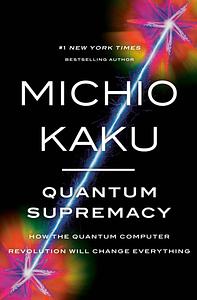Take a photo of a barcode or cover
73 reviews for:
Quantum Supremacy: How the Quantum Computer Revolution Will Change Everything
Michio Kaku
73 reviews for:
Quantum Supremacy: How the Quantum Computer Revolution Will Change Everything
Michio Kaku
I know very little about Quantum anything and possibly only marginally more after reading this. It was, I thought, a bit of a fairytale. It seems to me, and I could be entirely wrong, because I found the book tricky, that Quantum computing is something everyone wants and nobody really understands. This book is about all the things it might do, if anyone can make it work. About 80% of the book lists all the world's problems and then the other 20% is what might be done to solve them, if quantum computing ever gets to be more than a prototype or a boffin's dream.
informative
medium-paced
A very disappointing book. I expected this book to be an overview of the theories behind Quantum computing. Instead it was a laundry list of things one might do with Quantum computers. Even that description makes this book sound more interesting than it was.
Basically any time the author said Quantum computer, you could replace it with 'big computer' without making the book any less informative. The author tried to claim that quantum computers were both sufficient and necessary for the - very - theoretical computational breakthroughs he discusses in the book, but utterly failed to do so. He might as well have listed things to do with more powerful computers.
To give him the slightest bit of credit there is a very short surface level discussion at the beginning of the book that calls out two reasons the current model of computing might not yield future break throughs at the rate it has historically. However, both argument fell flat in justifying the necessity of quantum computers. These were:
Basically any time the author said Quantum computer, you could replace it with 'big computer' without making the book any less informative. The author tried to claim that quantum computers were both sufficient and necessary for the - very - theoretical computational breakthroughs he discusses in the book, but utterly failed to do so. He might as well have listed things to do with more powerful computers.
To give him the slightest bit of credit there is a very short surface level discussion at the beginning of the book that calls out two reasons the current model of computing might not yield future break throughs at the rate it has historically. However, both argument fell flat in justifying the necessity of quantum computers. These were:
- Moore's law: Transistors are getting close to atom sized so we can't keep making them smaller to get more computational power. Quantum computers don't just use 0 and 1 but all the space in between so qdots of the same size can calculate more than transistors.
- My counterpoint - computers could be bigger or algorithms could be optimized.
- The world is probabilistic: Real computers use 0s and 1s but the world is based on probabilities therefore only a probability based quantum computer con model it. So there are some problems current computers just can't solve.
- My counterpoint - computers do solve for probabilities and do accurately model real world phenomena so this is a dumb argument.
To be clear I'm not saying the author is wrong just saying he did a bad job of explaining his points. This book is useless.
challenging
hopeful
informative
inspiring
medium-paced
informative
A brief look into quantum computers and fields where they could be useful.
challenging
informative
reflective
medium-paced
informative
medium-paced
informative
inspiring
Good! As always from the author, I didn't quite follow some parts, but I think that's a readers fault, not the authors.
This really should have just been a short magazine article. It is 95% fluff speculating about a wide range of current science research areas with the word quantum dropped in here and there.
adventurous
challenging
funny
hopeful
informative
inspiring
mysterious
reflective
fast-paced
informative
medium-paced



